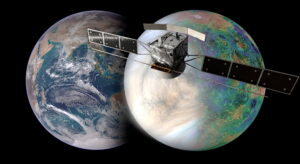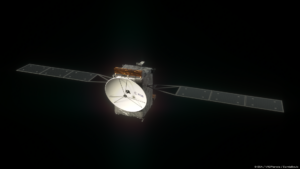Czech scientists will explore Venus with EnVision mission
Thanks to the support of the Ministry of Education, Youth and Sports (MEYS) Czech scientists will take part in the next “medium-class” mission of the European Space Agency (ESA) Science Programme, EnVision. The mission aims to explore the nearest neighbouring planet of the Earth – Venus and contribute to our understanding why Earth’s closest neighbour is so different.
EnVision mission
EnVision will perform high-resolution radar mapping and atmospheric studies. The mission should help scientists understand the relationships between its geological activity and the atmosphere, and it should investigate why Venus and Earth took such different evolutionary paths. The planned launch of EnVision is in 2031, the first data taken from the vicinity of Venus are expected in mid-2033.
EnVision will be equipped with scientific instrumentation allowing combined observations at wavelengths from UV to radio frequency at an unprecedented scale of resolution, from the core to the upper atmosphere of Venus – the surface radar VenSAR, subsurface sounding radar SRS, three spectrometers VenSpec to study chemical composition of atmosphere and surface and with a radio science experiment.
Artist impression of the EnVision mission, credit: NASA / JAXA / ISAS / DARTS / Damia Bouic / VR2Planets
Czech participation in EnVision mission
The Czech team, led by scientists from the J. Heyrovský Institute of Physical Chemistry of the Czech Academy of Sciences, will be responsible for the development, testing and production of electronic components for the VenSpec-H instrument, which is one of the three spectrometers of the probe aimed at capturing high-resolution spectra of Venus’ atmosphere. Scientists from the Institute of Geophysics of the CAS and the Czech Geological Survey will be also involved in the project. The development and production of the electronic boards will be provided by Czech companies selected under a tender opened by ESA.
The primary focus of Czech scientists is on exploring the atmospheric chemistry and volcanic activity of Venus. The EnVision mission will enable observations of previously unexplored processes on dust particles, which until now have been examined only in a laboratory setting. Additionally, Czech scientific research is also concentrating on volcanoes, examining their influence on the planet’s surface morphology and atmospheric composition.
The main technical-science and development role of the Czech scientific team is to compose data sets for testing the electronic components, mainly focusing on data quality, size and flow, and the preparation of these datasets by means of software tools. Recording of the experimental spectra and generating excessive simulated spectral libraries will enable rigorous testing (including calibration/validation) and further assessment of effectivity of the built electronic set up in corresponding spectral range and resolution for data processing of spectra recorded by VenSpec-H channels.
EnVision, credit: ESA/VR2Planets/Damia Bouic
Financial costs
The Czech participation in the EnVision mission will be supported in the first phase in the amount of almost 505 kEUR from the contribution of MEYS to the ESA PRODEX programme. The total cost of the Czech participation is expected to reach 3,27 million EUR. The cost of the EnVision spacecraft, which does not include scientific instrumentation and is funded by the ESA’s Science Programme, is estimated at 610 million EUR.
ESA is an international organisation dedicated to cooperation in space research and development and applications of space technology. The MEYS’s contribution to ESA’s R&D programmes is 13,6 million EUR in 2023.

